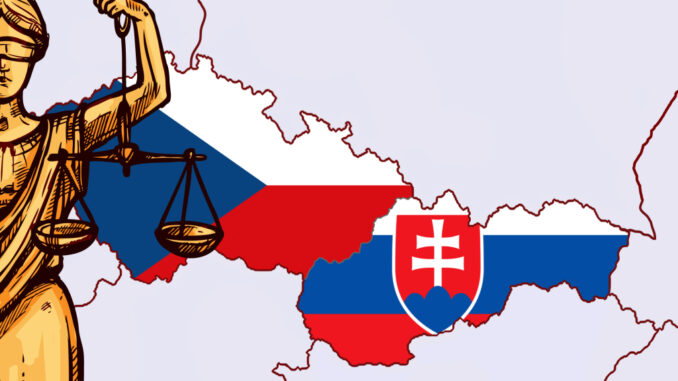
Two reports published today by the European Roma Rights Centre (ERRC) expose the extent to which antigypsyism and institutional racism is embedded in the criminal justice systems of the Czech Republic and Slovakia. The country reports were produced in partnership with the global criminal justice watchdog Fair Trials.
ERRC President, Đorđe Jovanović, said “what we see in general society is mirrored in the institutions as well, it is not just a matter of racist police officers, racist prosecutors, or racist judges – it is an entire justice system that needs major reform in these countries in order to deliver anti-racist justice and eliminate this culture of antigypsyism that exists in criminal justice institutions.”
The relevance of the two reports is illuminated by particularly shocking cases of extreme police violence and institutional oversight in recent years: the notorious mass raid in Moldava nad Bodvou, Slovakia in June 2013; and the death of Stanislav Tomáš in June 2021 in the Czech Republic.
The research findings shine a light on how antigypsyism is not only pervasive in these societies but engrained and routinised in their criminal justice systems. Romani defendants face discrimination at every stage of criminal proceedings from police, judges, prosecutors, and often their own lawyers. The evidence from the reports and the ERRC’s caseload over 25 years clearly demonstrates that law enforcement agencies are institutionally racist, and there is official tolerance of a culture of impunity within criminal justice institutions when it comes to mistreatment of Roma.
Fair Trials’ UK & International Legal Director, Bruno Min, said “Anti-Roma racism in criminal justice systems is a reality that governments across Europe must confront. It cannot be dismissed as a matter of isolated incidents, or a ‘few bad apples’, but be viewed as a systemic challenge that damages communities and perpetuates false, prejudicial attitudes towards Romani people. We can only make progress if the police, the courts, the prosecution service, and the legal profession acknowledge both the scale of the challenge, and the need to make extensive, meaningful changes to address structural inequalities in the criminal justice system.”
In both countries, there is a broad consensus amongst the Romani interviewees, police, judges, prosecutors, and defence lawyers interviewed for these studies that Roma are overrepresented in the criminal justice system. This is due to a combination of reasons which include persistent racial profiling and over-policing of Romani communities, social marginalisation and higher rates of poverty, lack of eligibility for alternatives to sentencing, and a presumption of guilt rooted in wider racist narratives that associate Romani people with crime.
The new research was based on a series of interviews conducted between May – September 2020 with people of Romani origin and professionals working in the criminal justice system: police officers, prosecutors, defence lawyers, and judges. The interviewees were selected considering two main factors: experience with the criminal justice system, and a geographical spread to ensure different regions were covered.
Justice Denied: Roma in the criminal justice system of the Czech Republic can be read here in English and Czech.
Justice Denied: Roma in the criminal justice system of Slovakia can be read here in English and Slovak.
This press release is also available in Slovak.
Redaktionen
redaktionen@dikko.nu
Att vara en oberoende tidning kostar pengar så vill du hjälpa oss med att betala vårt fika får du gärna swisha en slant till 123 242 83 40 eller bg: 5534-0046
Vill du annonsera eller sponsra, synas eller höras i våra media?
Kontakta oss på redaktionen@dikko.nu
eller ring 0768 44 51 61
IBAN: SE19 9500 0099 6042 1813 4395
BIC: NDEASESS




